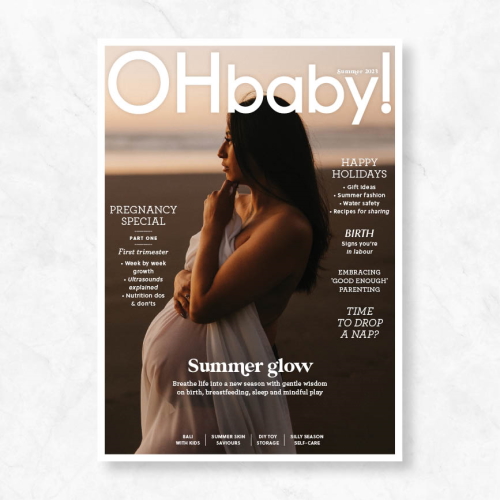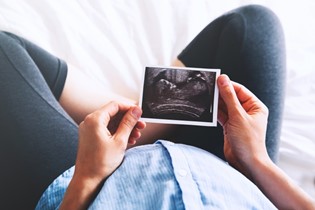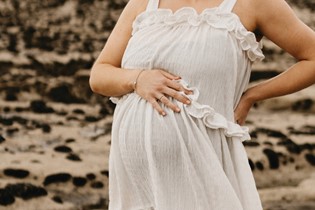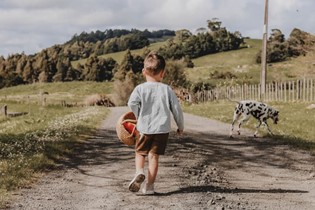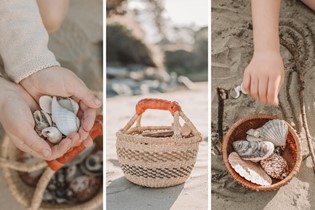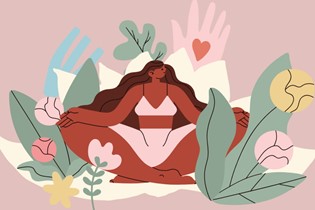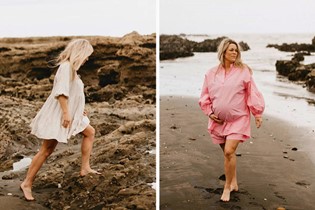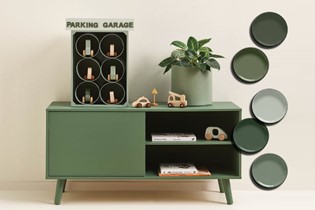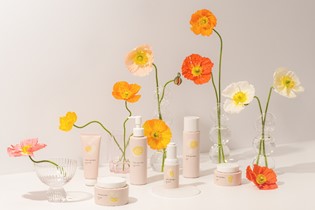Tips for breastfeeding your baby during the summer months

Midwife, lactation consultant and mum of five, Stephanie Callaghan-Armstrong shares all her summer breastfeeding tips.
Summer is officially here and for most of us we will be hoping for a long, hot, dry one after an almost relentless year of rain and floods! A hot summer for breastfeeding mums however can also mean maintaining some balance of cooling and hydration for baby and yourself. You’ll also need to manage energy and stress levels to prevent supply dropping and being aware of challenges such as mastitis and thrush, which can be a little more prevalent in the hottest and busiest time of year.
HYDRATION
Hydration is probably the biggest thing to think about for breastfeeding in summer. Your body requires up to four litres of water a day to produce the average of 750-1000 mls of breast milk. Be sure to add on top of that your own hydration needs! Cold or iced water is the best refresher, have plenty on hand and a good rule of thumb is to always drink when feeding baby to replenish what they’re removing.
There are now some great thermos type drinking cups on the market which even keep ice cubes intact all day, invest in one to keep your water refreshing and try adding in lemon, berries or mint. Some mums in different cultures prefer hot water, and that's totally fine too. Herbal teas can be great, which can be made hot or cold, but limit caffeine as it’s dehydrating and a small amount can pass through your milk to baby.
Alcohol can be very tempting with all the summer cocktails and bubbles at parties and BBQs but it is also dehydrating and not recommended when breastfeeding as it passes through your milk. Blood alcohol = milk alcohol, and while it naturally reduces in levels with time in your system, baby's brains don't have the same protection filters we do for alcohol so it's best to avoid. If you have a special occasion and want to drink alcohol, expressing or 'pumping and dumping' prevents breast engorgement and possible mastitis from missing feeds and is definitely recommended, especially in the earlier months of breastfeeding your baby. Eating with alcohol consumption will also help your body metabolize it and lessen levels in your system. Try alcohol-free or lite special drinks and cocktails, make them yummy and fun and less sweet to sip on with lime or soda. Drinking alcohol alternatives or at the very least, low alcohol drinks, may be a preferable way of enjoying occasions when in this breastfeeding season of life. Expressing your milk to pump and dump can be done by hand expressing or with a breast pump. It can be difficult to remove a full feed amount by hand expressing so if you’re going to be doing it regularly, an electric pump is best.
Does baby need water too? While milk doesn't seem the most thirst quenching drink for us, breast milk has the perfect superfood composition for all seasons to hydrate your baby.
In fact, your body adjusts your milk so cleverly for the weather, barometer and also baby's gestation for optimum nutrition and hydration. Breast milk is 90% water, hence why additional water is not needed and why breastfeeding mums need to drink so much to replace it when they feed. For older breastfeeding babies starting on or eating solids though, introducing water as an alternative drink via a sippy cup is a good option.

NUTRITION
Nutrition and diet is also of huge importance to new mums to help produce good quality breast milk and nourish themselves and baby. Recovering from childbirth, replacing depleted mineral stores and maintaining energy levels are vital. Babies take what they need but it can have a lifelong impact on you if you’re not eating a balanced diet. For example, your bone density will naturally decrease during pregnancy and breastfeeding to provide baby with calcium to grow – if that’s not replaced by what you eat it can affect you later in life and even in the short term with brittle bones. You really are what you eat at this time.
During summer and especially the 'silly season', you may find it tricky to take the time to prepare nutritious meals with a new baby and possibly other children. My advice would be to try and start the day with a good breakfast. Smoothies can provide both nutrition and hydration and with the addition of protein powder, can be a good way of making sure you look after yourself if you’re on the go that day. Whole-grain oats, nuts, whole grain toast with proteins like cheese, yoghurt, avocado or eggs can also be great.
Salad is always a summer hit but be sure to add protein and whole-grain carbs to give you your breast-milk-making fuel!
Veges and fruit, especially fresh or lightly cooked, are packed with nutrients, and summer fruit is just so good! Be aware though that some foods may cause windiness or intolerances in baby, especially if consumed in large amounts. Strawberries for example, if eaten by the punnet (easy to do!) can give baby a very sore puku and rashes from the acidity through your milk, so everything in moderation is the best policy. Other foods to watch may include broccoli, cabbage, onions, tomatoes (raw particularly) and chocolate (sorry). Some babies don't tolerate mum eating dairy and wheat/gluten so try to gauge whether baby seems extra windy, upset or is having rashes etc after eating certain foods – making a note sometimes can be useful to remember. There are also apps you can download which can be useful for tracking changes like this.
Watch the summer takeaways, as so many are calorie-dense but light on nutrition. If you eat meat, red meat intake is the best way to increase depleted iron levels. Low iron can affect your ability to produce a good supply so if you're reading this when pregnant, work on building iron stores up to help your milk supply after birth (taking into account blood loss can decrease your iron through the birth process). Try to also reduce refined sugar intake as it's known particularly in summer to increase the incidence of candida (thrush) in both mum and baby, and also urinary tract infections which can cause babies to be quite unsettled.
Supplements are recommended to continue beyond pregnancy also and many multivitamins are made for both pregnancy and breastfeeding mums. When breastfeeding, you have an increased requirement for calcium, iron, B12 and other supplements like fish oils for baby's brain development. Probiotics for both yours and baby's gut health are also beneficial.
For older babies, the World Health Organisation says breast milk is still the most important and beneficial form of nutrition until the second year of life. As you add in solid food around the six month mark, (guided by a health professional like Plunket is best) mix baby's puréed meals with breast milk. Cooler foods in the summer may be preferred, so finger foods using the self-lead weaning method of allowing them to explore food and eat with their hands, rather than everything being spoon fed may also be a good option to explore.
CLOTHING
Dressing babies in natural fibres like cotton and other breathable fabrics is also really important over summer, as they can get irritable and fussy if they feel hot during feeding. I would suggest breastfeeding baby in a singlet or nappy only if the weather is really hot. Find a cool place and/or use a fan or aircon if necessary.
Many new mums experience night sweats or increased body temperature when lactating which can be uncomfortable and sometimes distressing. Some report waking up with the bed saturated (it's a real thing!) and a bedding and PJs change is needed.
As your breastfeeding hormone prolactin rises, your oestrogen is lowered and can cause the sweats, exaggerated by high temperatures and humidity over the summer months.
Sleeping on a towel and by a fan can help a lot. Wear breathable fabrics like cotton rather than polyester or just a feeding bra. Be reassured that it will pass. In fact, usually night sweats are in the earlier few weeks only of establishing breastfeeding as the hormones adjust and it will settle down.
CHRISTMAS
The 'most wonderful time of the year' can be extra demanding when you're effectively on 24 hour day and night shifts with a breastfeeding baby. Give yourself permission to do less this year. Keep the decorations simple, organise vouchers online for gifts, or even skip presents altogether or only buy for the kids in your family. If you usually host Christmas you could organise for someone else to, or even opt for a restaurant or a beach picnic with disposable plates and easy food. Delivered meal kits are also fab and can majorly cut down the stress associated with cooking and/or hosting. Strip it all back and focus on baby, family and loved ones.
Consider having baby cared for for short periods to do jobs such as such as Christmas and food shopping or maybe a treat like getting your hair or nails done. Try to have alternate ‘home’ and ‘out’ days so you can achieve balance in this busy season. If you race baby around day after day in their car seat and the buggy in the mall with rushed stops to breastfeed in the car or parents room, you will be even more exhausted than you already are, and it very well may affect your milk supply. I do recommend getting a Santa photo in though! Remember to continue or start new traditions and make memories with baby even when they're small.
BEACH AND SUMMER HOLIDAY TIPS
Beach days and babies can be glorious but also sandy, hot and risky for dehydration and sunburn (sorry to be the party pooper!). The most important things for baby are hydration, shade, and ensuring there’s a cool place to nap.
Try and find a beach with big bushy pōhutukawa to set up your picnic under, or pack a beach tent if there’s no shade.
Bring a chilly bin with plenty of cool drinks and food, cushions to rest and sleep, sunblock, cover-ups and hats. Babies under six months are best not having their skin exposed at all to direct sunshine as sunblock is not recommended at this young age. Breastfeed baby every few hours for hydration and make sure they’re dressed appropriately for the temperature. Babies can go in the sea at any age if it's not too cold, with all safety measures in place of course.
LOW MILK SUPPLY?
You may find your milk supply drops or you feel like you're struggling to keep up with baby's appetite demands during busy times or very hot temperatures. 'Supply and demand', where your body adjusts to make enough milk by what baby asks for when suckling, is truly a clever thing, but it's also finely tuned with baby latching correctly and regularly. If you're rushing, getting tired and maybe not stopping for food and drink enough, as well as not giving baby full feeds and not emptying your breasts regularly, it’s hard for your body to maintain the message to your brain to make enough milk. Feeding in the car occasionally is okay but not the best for either mama or bubs comfort-wise. Instead I’d go for a parent’s room at the mall where you can really have a rest and relax together in peace and quiet.
INCREASING SUPPLY
I don't recommend supplementing with formula if you can help it, as in fact your supply will likely drop further due to less demand, and never catch up. Stop... rest... feed (or express) is the best answer. Eat lots of protein-rich, milk-boosting foods, increase fluids and skin-to-skin contact with baby in bed to increase the breastfeeding hormones. Try a late night feed or express at night if baby has stretched out their sleeps and not waking so much, as lactation hormones increase the most at night to make your milk. If you have things that are stressing you out, try your best to eliminate them (easier said than done, I know), it can make a huge difference. Taking 'galactagogues' may also help, they are foods or supplements that help increase milk supply. These include blessed thistle capsules, fenugreek herb, goats rue, brewers yeast, and there are many other teas, supplements and remedies available. Expressing after feeds and double pumping is also great as it increases prolactin levels to help boost your supply. Back in the day women were told to drink stout (a strong type of beer) to increase milk supply, and some older members of your family may still suggest it – however, it’s not recommended now of course, as it's alcoholic. Try not to stress, your milk should come back to a good supply if you take it easy and put these things into place. Occasionally your Lead Maternity Carer (LMC) or GP may prescribe medicine to help increase your prolactin levels. Never take cold and flu oral medications that dry up secretions as they can suppress your supply, and if you're away from baby and missing a feed try your best to express at the time to maintain your supply and prevent mastitis.
MASTITIS
Mastitis often feels like you have the 'flu' and it can make you feel really lousy. Stop and rest, empty your breasts, massage (including heat and cold compresses) and refuel. Hydration will also help the body to flush out toxins and reduce inflammation in the mammary glands. Express for comfort and to help reduce any engorgement, plus to get your milk flowing if there are any blockages. High dose Vitamin C (3-5000 g a day) spread over 24 hours has been shown to combat mastitis and prevent antibiotics being needed. Antibiotics should never be our first line of treatment for mastitis, because it can also kill off the good bacteria in our bodies and result in an overgrowth of candida (thrush) which affects baby too. If you develop mastitis and it’s not improving with the above recommendations, don’t hesitate to see your LMC or GP, as it can become serious if left untreated.
If you do need antibiotics, probiotic treatment helps to prevent thrush, which seems to be at the highest rates in summer due to the extra warmth in which thrush thrives, and possibly the increased sugar ingestion of the festive season. Go easy on sugar intake and eat other fermented foods to restore the good bacteria in yours and baby's gut. A prescribed anti-thrush cream may also be necessary for nipples that have the tell-tale thrush symptoms which include a stabbing/burning pain when feeding. Sometimes baby will get a thrush nappy rash, which is spotty and raw and doesn't seem to go away with the usual zinc or barrier cream.
TRAVEL TIPS
You may plan to travel with your little one this summer on a road trip as Kiwis love to do. When driving, stop regularly for breastfeeding as baby can go into a deep sleep in their car seat and also hurt their back if not able to stretch out every few hours. Plan snacks for yourself too to keep up the calories, and try not to be in a rush. Take extra changes of clothing and the comforts of home.
Remember you only get this summer with your baby being this little. Make memories and enjoy this time by prioritising yourself, your baby and your family this year.
Stephanie Callaghan Armstrong is a mum of five, experienced Lead Maternity Carer, Midwife and Lactation Consultant and also runs a breast pump rental and sales business with husband, Dr Mikey from The Barnstead in Coatesville. Find her at babymed.co.nz, @babylove.midwife.life
and @babymednz on Instagram.

AS FEATURED IN ISSUE 64 OF OHbaby! MAGAZINE. CHECK OUT OTHER ARTICLES IN THIS ISSUE BELOW
